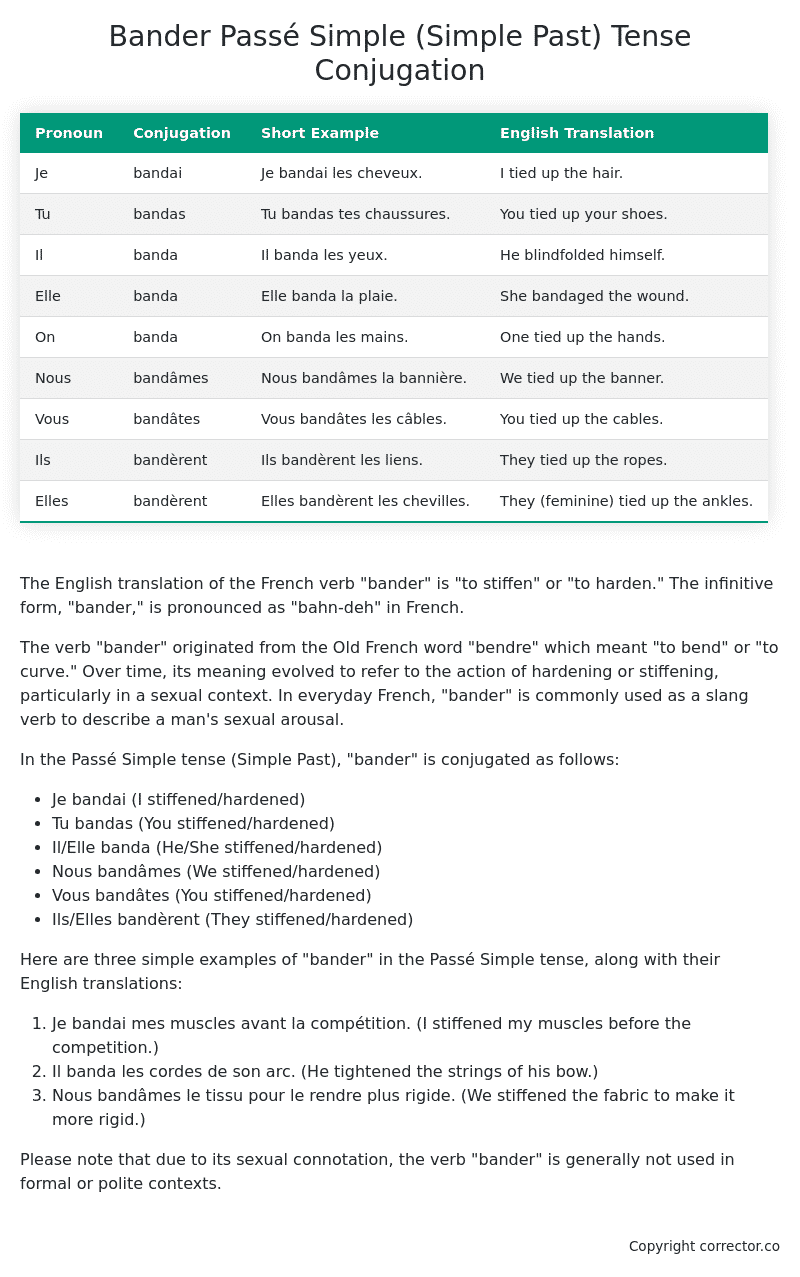Passé Simple (Simple Past) Tense Conjugation of the French Verb bander
Introduction to the verb bander
The English translation of the French verb “bander” is “to stiffen” or “to harden.” The infinitive form, “bander,” is pronounced as “bahn-deh” in French.
The verb “bander” originated from the Old French word “bendre” which meant “to bend” or “to curve.” Over time, its meaning evolved to refer to the action of hardening or stiffening, particularly in a sexual context. In everyday French, “bander” is commonly used as a slang verb to describe a man’s sexual arousal.
In the Passé Simple tense (Simple Past), “bander” is conjugated as follows:
- Je bandai (I stiffened/hardened)
- Tu bandas (You stiffened/hardened)
- Il/Elle banda (He/She stiffened/hardened)
- Nous bandâmes (We stiffened/hardened)
- Vous bandâtes (You stiffened/hardened)
- Ils/Elles bandèrent (They stiffened/hardened)
Here are three simple examples of “bander” in the Passé Simple tense, along with their English translations:
- Je bandai mes muscles avant la compétition. (I stiffened my muscles before the competition.)
- Il banda les cordes de son arc. (He tightened the strings of his bow.)
- Nous bandâmes le tissu pour le rendre plus rigide. (We stiffened the fabric to make it more rigid.)
Please note that due to its sexual connotation, the verb “bander” is generally not used in formal or polite contexts.
Table of the Passé Simple (Simple Past) Tense Conjugation of bander
| Pronoun | Conjugation | Short Example | English Translation |
|---|---|---|---|
| Je | bandai | Je bandai les cheveux. | I tied up the hair. |
| Tu | bandas | Tu bandas tes chaussures. | You tied up your shoes. |
| Il | banda | Il banda les yeux. | He blindfolded himself. |
| Elle | banda | Elle banda la plaie. | She bandaged the wound. |
| On | banda | On banda les mains. | One tied up the hands. |
| Nous | bandâmes | Nous bandâmes la bannière. | We tied up the banner. |
| Vous | bandâtes | Vous bandâtes les câbles. | You tied up the cables. |
| Ils | bandèrent | Ils bandèrent les liens. | They tied up the ropes. |
| Elles | bandèrent | Elles bandèrent les chevilles. | They (feminine) tied up the ankles. |
Other Conjugations for Bander.
Le Present (Present Tense) Conjugation of the French Verb bander
Imparfait (Imperfect) Tense Conjugation of the French Verb bander
Passé Simple (Simple Past) Tense Conjugation of the French Verb bander (You’re reading it right now!)
Passé Composé (Present Perfect) Tense Conjugation of the French Verb bander
Futur Simple (Simple Future) Tense Conjugation of the French Verb bander
Futur Proche (Near Future) Tense Conjugation of the French Verb bander
Plus-que-parfait (Pluperfect) Tense Conjugation of the French Verb bander
Passé Antérieur (Past Anterior) Tense Conjugation of the French Verb bander
Futur Antérieur (Future Anterior) Tense Conjugation of the French Verb bander
Subjonctif Présent (Subjunctive Present) Tense Conjugation of the French Verb bander
Subjonctif Passé (Subjunctive Past) Tense Conjugation of the French Verb bander
Subjonctif Imparfait (Subjunctive Imperfect) Tense Conjugation of the French Verb bander
Subjonctif Plus-que-parfait (Subjunctive Pluperfect) Tense Conjugation of the French Verb bander
Conditionnel Présent (Conditional Present) Tense Conjugation of the French Verb bander
Conditionnel Passé (Conditional Past) Tense Conjugation of the French Verb bander
Conditionnel Passé II (Conditional Past II) Tense Conjugation of the French Verb bander
L’impératif Présent (Imperative Present) Tense Conjugation of the French Verb bander
L’impératif Passé (Imperative Past) Tense Conjugation of the French Verb bander
L’infinitif Présent (Infinitive Present) Tense Conjugation of the French Verb bander
L’infinitif Passé (Infinitive Past) Tense Conjugation of the French Verb bander
Le Participe Présent (Present Participle) Tense Conjugation of the French Verb bander
Le Participe Passé (Past Participle) Tense Conjugation of the French Verb bander
Struggling with French verbs or the language in general? Why not use our free French Grammar Checker – no registration required!
Get a FREE Download Study Sheet of this Conjugation 🔥
Simply right click the image below, click “save image” and get your free reference for the bander Passé Simple tense conjugation!

Bander – About the French Passé Simple (Simple Past) Tense
Formation
Usage
Narration
Historical Context
Interactions with other tenses
Passé Composé
Imparfait
Conditional and Subjunctive
Summary
I hope you enjoyed this article on the verb bander. Still in a learning mood? Check out another TOTALLY random French verb conjugation!


